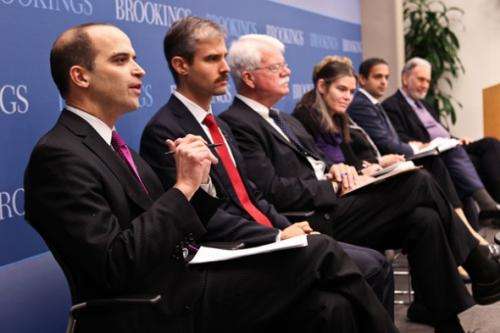'Wake-up call' for higher education

Joseph E. Aoun, pres¬≠i¬≠dent of North¬≠eastern Uni¬≠ver¬≠sity, said America's higher-‚Äč‚Äčeducation system has flour¬≠ished because of its social com¬≠pact with the country's cit¬≠i¬≠zens. As part of that agree¬≠ment, insti¬≠tu¬≠tions pro¬≠vide edu¬≠ca¬≠tion and help people live ful¬≠filling and accom¬≠plished lives, while also ensuring that the U.S. remains strong and com¬≠pet¬≠i¬≠tive on a global level.
Now, Aoun said, a new survey com¬≠mis¬≠sioned by North¬≠eastern serves as a "wake-‚Äč‚Äčup call" for higher edu¬≠ca¬≠tion to become more aware of stu¬≠dents' evolving needs. And the higher edu¬≠ca¬≠tion com¬≠mu¬≠nity, he said, is taking notice.
"The social com­pact has to be rethought and rede­fined, and we are here to do that," Aoun said in his keynote address at a forum Tuesday morning in Wash­ington D.C. The forum, enti­tled "Inno­va­tion Imper­a­tive: The Future of Higher Edu­ca­tion," was hosted by North­eastern in col­lab­o­ra­tion with the Brook­ings Insti­tu­tion and attended by leaders from gov­ern­ment, acad­emia, the news media and the pri­vate sector.
The results of the national opinion poll were released at the event. The poll was con­ducted by FTI Con­sulting, and was based on 1,001 tele­phone inter­views of Amer­ican adults and an over­sample of 250 Amer­ican young adults, ages 18 to 30, sur­veyed online in October.
Among the top find­ings were that Amer­i­cans strongly value higher edu­ca­tion and that there are more oppor­tu­ni­ties today to achieve a col­lege edu­ca­tion than in past gen­er­a­tions. How­ever, while respon­dents believe the U.S. is a global leader in higher edu­ca­tion, they said greater invest­ments are needed to main­tain that standing. They also acknowl­edged there are sig­nif­i­cant obsta­cles making it harder to achieve a col­lege degree today, and they called for greater inno­va­tion to ensure the U.S. remains at the fore­front of higher edu­ca­tion in the world.
In par¬≠tic¬≠ular, Aoun noted that survey par¬≠tic¬≠i¬≠pants called for more flex¬≠i¬≠bility, online/‚Äčhybrid edu¬≠ca¬≠tion options and oppor¬≠tu¬≠ni¬≠ties for expe¬≠ri¬≠en¬≠tial learning, entre¬≠pre¬≠neur¬≠ship and global expe¬≠ri¬≠ences. He also pointed to respon¬≠dents' con¬≠cerns of rising costs, global com¬≠pe¬≠ti¬≠tion, stu¬≠dents finding jobs after grad¬≠u¬≠a¬≠tion and grad¬≠u¬≠ates today having fewer oppor¬≠tu¬≠ni¬≠ties than their parents.
How­ever, Aoun cited an "explo­sion of inno­va­tion" in higher edu­ca­tion that is aimed at addressing these con­cerns, including short­ening the path to degree and advance­ments in how aca­d­emic courses are assessed.
Aoun has been a national leader on issues crit­ical to higher edu­ca­tion. He is board chair of the Amer­ican Council on Edu­ca­tion and a member of an aca­d­emic advi­sory council that reports directly to Home­land Secu­rity Sec­re­tary Janet Napolitano.
The event also fea¬≠tured a panel dis¬≠cus¬≠sion mod¬≠er¬≠ated by David Leon¬≠hardt, the Wash¬≠ington bureau chief of The New York Times. Pan¬≠elists com¬≠prised: Molly Broad; pres¬≠i¬≠dent of the Amer¬≠ican Council on Edu¬≠ca¬≠tion; Michael Horn, co-‚Äč‚Äčfounder of Innosight Insti¬≠tute; Daphne Koller, co-‚Äč‚Äčfounder of Coursera; U.S. Con¬≠gressman George Miller, senior Demo¬≠c¬≠ratic member of the House Edu¬≠ca¬≠tion and the Work¬≠force Com¬≠mittee; John Sexton, pres¬≠i¬≠dent of New York Uni¬≠ver¬≠sity; and Pra¬≠teek Tandon, an econ¬≠o¬≠mist at the World Bank.
The engaging panel dis­cus­sion shifted between a range of topics, from the cost of higher edu­ca­tion to quan­ti­fying the impact of a col­lege edu­ca­tion. Leon­hardt said that while the dis­cus­sion focused largely on the ways to improve higher edu­ca­tion in America, the system largely works very well and "remains the envy of the world." He also said it pro­duces a "phe­nom­e­nally broad return," citing the cur­rent 3.8 per­cent unem­ploy­ment rate for col­lege grad­u­ates, well below the national average.
How­ever, Leon­hardt pointed to sta­tis­tics that show only half of those who enter col­lege earn degrees, as well as the gap in access to higher edu­ca­tion based on eco­nomic status.
Early in the panel dis­cus­sion, Sexton com­mented on how col­leges and uni­ver­si­ties can main­tain their strengths while also addressing their weaknesses.
"I think the single most impor­tant thing that higher edu­ca­tion has to do is do what it does best, and that is 'think,'" Sexton said. "Thinking is the essence of what uni­ver­si­ties have been doing for a thou­sand years, and as we think, we should be unafraid to dis­rupt the received wisdom. That's also been a great strength in the advance­ment of knowledge."
Applying those ideas to today's chal­lenges, Sexton said higher edu­ca­tion must con­tinue to find new ways of being cre­ative and inno­v­a­tive, and also embrace dis­rup­tions from tech­nology and glob­al­iza­tion as "oppor­tu­ni­ties to create blended nuanced solutions."
Later, the dis­cus­sion shifted to the assess­ment of col­lege learning, and Koller was asked whether more must be done to refine this evaluation.
"One of the things that has emerged from the use of tech­nology in edu­ca­tion is that the ques­tions of what exactly are people learning and how do we assess it has to come to the front and center of how these new courses are con­structed," Koller said. "For courses with thou­sands of people in them, it's not pos­sible to just use the tra­di­tional, some­what ad hoc assess­ment mech­a­nisms that we've employed in higher education."
Koller acknowl­edged that most courses don't have a rig­orous struc­turing of learning out­comes and how assess­ments align with those learning out­comes. "When you're con­structing a course for thou­sands of people, that has to occur," she said. "This is not the solu­tion to the assess­ment problem, but it's a very valu­able step along the way."
On that same topic, Leon­hardt asked Broad about how to respond to a parent who asks how to deter­mine what his or her child actu­ally learned in college.
"[That] is the focus of a con¬≠sid¬≠er¬≠able amount of effort today in the issue of assessing learning out¬≠comes and to ensure that the things that really matter," Broad said. "That ability to have intel¬≠lec¬≠tual skills, to have a deeper knowl¬≠edge in a spe¬≠cial¬≠ized area, to apply what you have learned in a real-‚Äč‚Äčworld envi¬≠ron¬≠ment, to be able to com¬≠mu¬≠ni¬≠cate effec¬≠tively, both orally and through writing. Those are the things that I would urge they look for."
More information:
Provided by Northeastern University

















